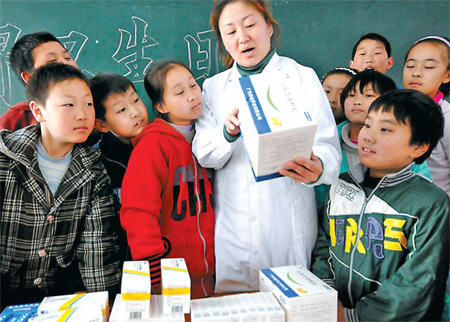Prime
Officials to fight drug resistance
Updated: 2011-04-08 08:00
By Shan Juan (China Daily)
|
For World Health Day on Thursday, a staff member of the anti-epidemic station of Jiyuan city, Henan province, tells pupils of the city's Mazhai Primary School how to properly use antibiotics. Miao Qiunao / for China Daily |
Beijing - China's top health authority said it will try every means to slow the increasing resistance to antibiotics of microbes on the mainland, a threat caused by an imprudent use of such drugs.
Experts said 70 percent of those who receive inpatient medical treatment in the mainland are given antibiotics, but only 20 percent of them actually need the drugs. The resulting resistance costs vast amounts of money and affects countless lives.
"There are many problems with the clinical use of antibiotics in our hospitals," said Ma Xiaowei, vice-minister of health, at a ceremony on Thursday to mark World Health Day. "The resulting rise in drug resistance has gradually become a huge obstacle to good healthcare in this country."
Jiao Yahui, a division director of the ministry, said surgical departments, where 97 percent of inpatients have been known to be prescribed antibiotics, are even more likely to use the drugs inappropriately.
Dr Fabio Scano, a World Health Organization medical officer, said: "The more that antibiotics are used, the higher antibiotic resistance will be in humans."
Ma said hospitals can do the most to ensure the proper use of antibiotics, and ordered them to prescribe the drugs in a scientific manner.
He said any hospital caught over-prescribing antibiotics will be named in public and the director of an offending institution may face warnings or administrative punishments.
Jiao noted the ministry is also drafting a new set of rules to govern medical institutions' use of antibiotics.
To date, China has set up networks to monitor the use of antibiotics and the appearance of various drug resistances at large hospitals, which get from 20 to 30 percent of their drug sales income by prescribing antibiotics of different kinds.
Dr Michael O'Leary, who represents the World Health Organization in China, said that the overuse of antibiotics is common in China and often results from the pursuit of profits.
"Without a change in the current system, in which public hospitals rely mainly on drug sales for income, it will be hard to solve this problem," said Professor Xiao Yonghong from the First Hospital of Zhejiang province.
From 30 to 50 percent of the infections contracted in hospitals on the mainland are caused by bacteria that are highly resistant to antibiotics. Those figures are much higher than they are in developed countries, said Xiao, citing results from his study.
Xiao's study also found each Chinese person consumes an average of 138 grams of antibiotics a year, more than 10 times the average amount consumed by US citizens.
The consequences are dire: About 80,000 people in China die each year from drug-resistant infections.
Specials

Share your China stories!
Foreign readers are invited to share your China stories.

Fill dad's shoes
Daughter and son are beginning to take over the family business of making shoes.

Have you any wool?
The new stars of Chinese animation are edging out old childhood icons like Mickey Mouse and Hello Kitty.
